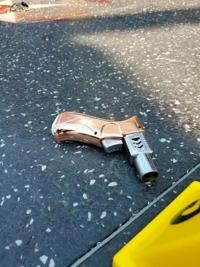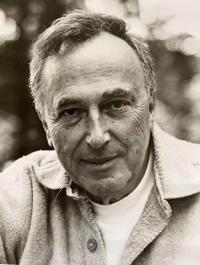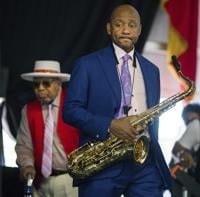SACRAMENTO, Calif. (AP) — California's attorney general said Thursday that he will not seek criminal charges against Los Angeles police officers who fatally shot a man on Hollywood Boulevard last year, even though it turned out the gun he carried was fake.
The shooting caused panic on the busy street, with tourists and bystanders ducking for cover.
It's the first such review under a new California law that requires the state Department of Justice to review all incidents where an officer shoots and kills an unarmed civilian in the state.
In this case, officers said they responded before noon on July 15, 2021, to reports that Matthew James Sova was walking with a handgun along the Walk of Fame, and at least one person reported seeing him pointing the gun at someone. He also had a small black folding knife with an open blade that he earlier pointed toward a building security guard, according to the department's report.
Sova “pointed what appeared to be a pistol, but was actually a lighter that looked like a firearm, at Officer (Christopher) Tabela,” said Attorney General Rob Bonta. “After a detailed analysis, DOJ concluded there was substantial evidence that officers (Isaiah) Galvez and Tabela acted in self-defense, and in the defense of others.”
The two LAPD officers fatally shot Sova less than a block from the Dolby Theatre, where the Oscars are normally presented, and near the famed corner of Hollywood Boulevard and Highland Avenue.
“Man, why?” Tabela could be heard asking Sova before the officer fruitlessly began performing CPR.
Although Bonta's office cleared the officers, it recommended that the LAPD make sure officers are trained on calling in the department's Mental Evaluation Unit and review whether Sova's death “could have been avoided.”
The initial call to LAPD said Sova was “acting crazy and loudly saying a bunch of different things.” He'd had 12 previous contacts with law enforcement related to his mental health, 10 of them with the LAPD Mental Health Unit.
Using other means “to address a potential mental health crisis ... may have given the officers time to engage in meaningful de-escalation," the review found. In this case, “both officers transitioned to a lethal response almost immediately upon arriving at the scene."
State lawmakers in 2020 required the attorney general to decide whether police violated the law in cases where civilians die. Previously, local prosecutors usually made those decisions, but legislators were spurred by nationwide outrage over killings by police and concerns that county district attorneys could be too close to local law enforcement agencies they work with on a daily basis.
shifting investigations to the state took effect on July 1, 2021, just days before the Walk of Fame shooting.
Bonta announced the investigations on July 7, 2021. Under those procedures, the department's California Police Shooting Investigation Team for Southern California went to the scene as soon as it was notified of the shooting by the Los Angeles Police Department. The team sent its report to the department’s Special Prosecutions Section for a decision on whether officers broke the law.
In this case, investigators interviewed seven emergency workers and 13 civilian witnesses. They also reviewed other evidence including video from surveillance cameras and cameras worn by the officers.
He said the department's goal is to complete reviews within a year, and this first investigation took longer than he wanted. But he said the results of the 24 other cases currently under review should now come more quickly as investigators have become more comfortable in their approach.
Bonta co-authored the law when he was in the state Assembly. It was narrowed from a broader version that would have allowed local officials to also request state investigations where armed suspects were killed. That change came after Bonta’s predecessor as attorney general raised concerns about the cost and workload. And it doesn’t apply to deaths other than by shootings.
“This effort is personal for me. I’ve heard firsthand the hurt and the pain that so many families and communities feel in the moments after these incidents. I’ve witnessed the lack of trust," Bonta said. He said moving responsibility to the state provides “a chance to insert more transparency and accountability into these investigations.”
The law leaves it to local law enforcement agencies to review whether officer followed departmental procedures or if there is any civil liability, as well as review any suspected crime that may have led to the shooting.









































